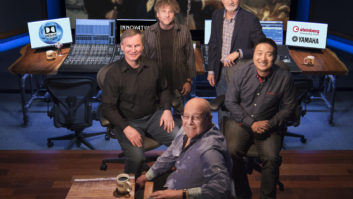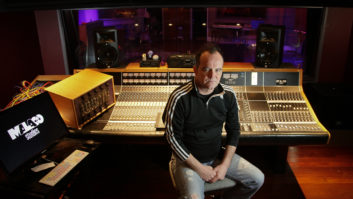LOS ANGELES, CA—For mastering engineer Maor Appelbaum, good communication is the key to any successful project. While working on two recently-released albums, by Meat Loaf and Faith No More, that collaboration brought about results that were greater than the sum of the parts, according to Appelbaum, while staying true to the intentions of both artists.
Meat Loaf’s new album, Braver Than We Are, released on CD, vinyl and digitally in September, once again features songs exclusively written by Jim Steinman. Combined, their previous collaborations have reportedly sold over 67 million copies, and their 1977 debut, Bat Out of Hell, is one of the bestselling albums of all-time.
Several years in the making, this latest album, produced and mixed by Meat Loaf ’s longtime guitarist/music director Paul Crook, is very dynamic, says Appelbaum. “But there’s movement and there’s clarity.”
Crook knew what he wanted in terms of the sonics, reports Appelbaum, who previously worked with the producer on a project with Frank DiMino, erstwhile singer of 1970s glam/hard rock band Angel. “There was a good communication between us, figuring out how to make it sound even better. Could we do it in the mastering or in the mixing? Paul would send me a mix; I’d give him input. I’d work on it and send it to him; he’d tell me he wanted more of this or that. This is a process that I like, because everybody is putting 150 percent into it. The final result sounds way better that way.”
Appelbaum mastered the Meat Loaf project digitally through his console hardware, avoiding plugins. “I have a dedicated digital chain which is very high quality: Waves Maxx BCL, L2 from Waves, Weiss EQ-1, TC System 6000, DiGiGrid IOC interface and Mutech MC-3+ clock. I also used the Maselec MTC 1X—if not on the analog transfer section, then the monitoring.
“There is EQ shaping, but it didn’t need coloration. It was more about getting the tracks to sound cohesive, pleasing and engaging.”
Rearranging an album’s sequence may require additional tweaks. “The EQs and levels can change, because this song was brighter than this one, but it was before that one and now it’s after. So now this song needs to be brighter and this other can be darker. It’s a process until you get everything nailed.”

All of those changes—EQ, dynamics, volume, fade in, fade out—were made with the artist’s blessing, he says. “Meat Loaf was involved at all times. He heard the tracks, he gave the approvals. If he wanted more or less space between the songs, that was his decision and we’d do it.”
A mastering engineer needs to be aware that something that appears to need “fixing” may be intentional. “Once you fix it, you create a different problem or lose what the artist intended. It’s a fine line, how much you are refining it on behalf of what you think is right. You might be right, but there’s a place where the artist has his original intention and you need to keep that, unless he wants you to change it.”
Those considerations also came somewhat into play on the Faith No More project, a deluxe reissue of the band’s 1985 indie label debut album, We Care a Lot, that also includes three tracks remixed by the original producer and mixer, Matt Wallace, four demos and two 1986 live recordings. The package was released on CD, vinyl and via download on band bassist Billy Gould’s Koolarrow Records in mid-August.
Appelbaum grew up in Israel listening to MTV UK, so he was familiar with Faith No More, who sprang to prominence when they re-recorded the first album’s title track for their major label debut. He also has a history with the band, having mastered a couple of 7-inch singles and the latest album, Sol Invictus. But the band’s debut album was less familiar to him. That said, he comments, “Sometimes when you’re really fresh to something, it takes a few tries to get the right sound. But at the same time, because you are fresh to it, it can yield better results.”
The original release was a little lacking in the lower octave and somewhat scooped in the mid frequencies, Appelbaum reports, with a brightness in the high-mids and the highs. “It’s very important to me with a remaster that it has to be the same, but different. The ‘different’ is really the challenge. Once you take it too far from where it was, the original audience starts judging the quality. The new audience is a different case, because they don’t know the original. So it’s very important to make sure that what comes out is the original plus, or what the original could have been.”
Again, success was due to the level of communication between the artist and the mastering engineer. “Beside Faith No More being a great band and innovative and interesting to listen to, Billy is a really cool person. He knows a lot about audio, he records and produces and mixes, he has good ideas about how he wants things to be—he’s open to ideas. It’s a very good two-way communication.”
As a result, mission accomplished. “It turned out really well. The band loved it,” he says.
Meselec
maselec.com
Maor Appelbaum Mastering
maorappelbaum.com







